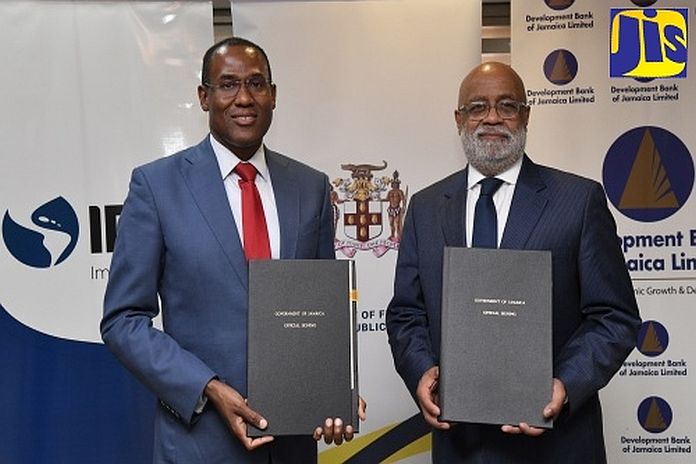By Chris Patterson
KINGSTON, Jamaica – A US$1.2-million technical cooperation agreement was on Thursday, November 9 signed between the Government of Jamaica (GOJ) and the Inter-American Development Bank (IDB) to strengthen the country’s public-private partnership (PPP) programme.
Minister of finance and the public service, Dr Nigel Clarke, and IDB general manager, Country Department Caribbean Group and Country Representative, Jamaica, Anton Edmunds, signed the agreement in relation to the non-reimbursable Technical Cooperation and preparation of Public-Private Partnerships Projects for the development of efficient and sustainable infrastructure in Jamaica through a Project Preparation Facility.
The signing took place at the finance ministry’s offices at National Heroes Circle in Kingston.
Addressing the ceremony, Dr Clarke welcomed the technical agreement’s establishment, noting that public and private financing is critical in building out Jamaica’s infrastructure needs.
“The infrastructure needs of Jamaica far outstrip the financial and fiscal capacity of the government. In order to address the infrastructure needs, we will have to use other modalities other than government financing, and one of the primary modalities will be through public-private partnerships and in areas where commercial activities are being undertaken by government [and] transferring those to the private sector by privatisation,” he said.
Dr Clarke advised that of the total figure, the IDB is providing US$750,000, with the remainder coming from the government.
“The significance to it is that it provides us with a pool of funds to develop projects that we can bring to the market and attract private investment for our infrastructure needs. This just represents the beginning. We hope to build on it and to be able to attract others to contribute to this project preparation facility so that Jamaica can advance our development by pursuing innovative transactions as we seek to build out our infrastructure,” he said.
Dr Clarke noted that Jamaica’s environment is hospitable and conducive to private investments, citing indicators such as the country’s robust foreign exchange reserves, low unemployment rate, and low debt to gross domestic product (GDP) ratio.
Meanwhile, Edmunds said a Project Preparation Facility (PPF) is one important step in the goal of catalysing new private-sector finance.
“The PPF will accomplish two objectives. It will select projects that will have a positive impact on society and are feasible from commercial, environmental, and technical perspectives, and it will deliver the best internationally available expertise to structure these contracts that have been prioritised so they can deliver value for money for the government, service users and the people of Jamaica,” noting that there is a persistent infrastructure gap in the wider Caribbean.
“The reality is that the government, any government of the region, is unable to finance that gap by itself. So, this is an avenue to bring resources to the table to address the desires of the government and to be able to deliver for the people of the country,” he said.
Acting managing director, Development Bank of Jamaica (DBJ), David Wan, said the US$1.25-million PPF will assist in funding the required preparation activities for PPP projects.
These activities include pre-feasibility and feasibility assessments, which aim to facilitate viable, sustainable, fiscally responsible and bankable projects. The DBJ is Jamaica’s central implementing agency for the government’s public-private partnership and privatisation programme.
Wan said PPPs are important tools for the government to implement public infrastructure and services by mobilising private-sector capital, innovation, skills and experience for sustainable, resilient infrastructure projects to facilitate economic growth and development.
He indicated that the DBJ has successfully completed more than 35 privatisations and PPP transactions since 2009. Of this number, Wan said the government has implemented five PPPs – the two toll highways, the Sangster International Airport, Kingston Container Terminal and the Norman Manley International Airport.
He further advised that two additional projects, the Rio Cobre Water Treatment Plant and Schools Solar Energy and Efficiency, have executed agreements and are on the way to being finalised and financed.
“These seven PPP transactions are valued at approximately US$2 billion in investments by the private sector. The DBJ will continue to play our role in facilitating investments in the Jamaican economy and delivering projects that will benefit future generations,” the acting managing director noted that the DBJ and IDB have had a long-standing partnership over the years regarding the PPP programme.
“As far back as 2012, the IDB provided support to develop and operationalise the government’s PPP policy and institutional framework. Since then, they have partnered with the DBJ in various ways, including assistance to fund advisors for specific PPP projects. They have helped us to create a PPP climate resiliency toolkit and supported PPP capacity building with DBJ and other government representatives,” he said.
Wan added that the IDB was instrumental in training and funding the first Jamaican cohort of 24 government officials who are all now PPP-certified professionals.
Permanent secretary, ministry of economic growth and job creation, Arlene Williams, noted that the IDB has been a steadfast partner in aiding the government to achieve its development objectives for several years.
She said the technical cooperation will increase the DBJ’s reach in helping other ministries and government agencies to structure their PPP projects towards impactful outcomes in the Jamaican society.





